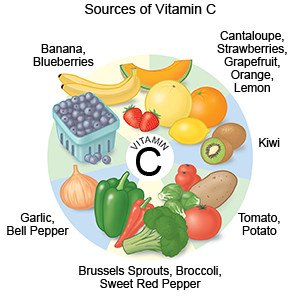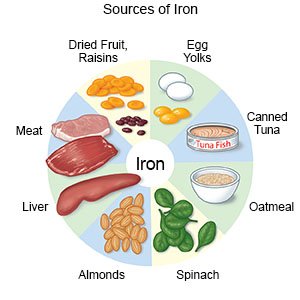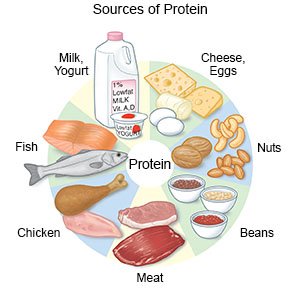Iron Deficiency Anemia
Medically reviewed by Drugs.com. Last updated on Aug 4, 2025.
AMBULATORY CARE:
Iron deficiency anemia (IDA)
happens when your body does not have enough iron to make hemoglobin. This means you will have low hemoglobin and red blood cell levels. Hemoglobin is part of red blood cells and helps carry oxygen throughout your body. Blood loss and not eating enough foods that contain iron are common causes of low iron.
Common signs and symptoms:
- Feeling weak, tired, or irritable
- Pale skin, cold hands, and feet
- Headache, dizziness
- Shortness of breath with activity or chest pain
- Fast or uneven heartbeat
- Sore or swollen tongue and mouth
- Nails that break easily
- An urge to eat things that are not food such as ice, paint, starch, or dirt
Seek care immediately if:
- You have dark or bloody bowel movements.
- You vomit blood.
- You are too dizzy to stand up.
- You have trouble swallowing because of the pain in your mouth and throat.
Call your doctor or hematologist if:
- You have heartburn, constipation, or diarrhea.
- You have nausea or are vomiting.
- You are dizzy or very tired.
- You have questions or concerns about your condition or care.
Related medications
Treatment options
The following list of medications are related to or used in the treatment of this condition.
Treatment for IDA
depends on the cause and may take 3 to 6 months. You may need any of the following:
- Medicines and supplements may increase the amount of iron in your blood. Ask your healthcare provider how much iron you should take each day. Tell your provider about all medicines you currently take.
- Iron infusions replace iron in your body through an IV in one of your veins. Your provider will tell you if an iron infusion is right for you.
- A blood transfusion may be needed if your anemia is severe. This will help replace the blood and iron you have lost.
- Surgery may be needed if your IDA is caused by bleeding in your intestines.
Take iron supplements with vitamin C:
Taking your iron supplement with food or drinks high in vitamin C helps your body absorb iron.
 |
Eat foods rich in iron and protein:
Nuts, meat, dark leafy green vegetables, and beans are high in iron and protein. Limit milk to 2 cups a day. The calcium in milk can interfere with how your body absorbs iron. Take the iron supplement with food or a drink that is high in vitamin C. This helps your body absorb the iron. You may need to meet with a dietitian to create the right food plan for you.
 |
 |
Drink liquids as directed:
Iron supplements may cause constipation. Liquids help prevent constipation. Ask how much liquid to drink each day and which liquids are best for you.
Follow up with your doctor or hematologist as directed:
You may need to see a specialist to help find the cause of your IDA. Write down your questions so you remember to ask them during your visits.
© Copyright Merative 2025 Information is for End User's use only and may not be sold, redistributed or otherwise used for commercial purposes.
The above information is an educational aid only. It is not intended as medical advice for individual conditions or treatments. Talk to your doctor, nurse or pharmacist before following any medical regimen to see if it is safe and effective for you.
Learn more about Iron Deficiency Anemia
Treatment options
Care guides
Further information
Always consult your healthcare provider to ensure the information displayed on this page applies to your personal circumstances.
